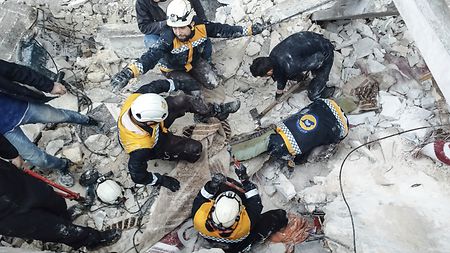
Immediate support for the people in Turkey
Together with its European and international partners, Germany stands ready to provide the necessary support to the Turkish aid workers on the ground. For it is essential in such emergencies to listen to the concrete requests of the countries affected and to provide what is actually needed.
Two search and rescue teams – sent by I.S.A.R. Germany and the Federal Agency for Technical Relief (THW) – have already begun work in Turkey. Many other EU partners have mobilised search and rescue teams with a total of more than 1000 emergency workers and 70 sniffer dogs via the EU Civil Protection Mechanism. These teams have been specially trained to rescue people from such emergencies using heavy equipment and dogs. The THW has also offered to provide a technical support team to reinforce an EU team of experts.
The Federal Police is providing assistance, too. Some 25 officers, including doctors, paramedics and dog handlers, have arrived in Turkey to rescue people from the rubble.
But not only emergency service personnel but also relief supplies are needed. Given the freezing cold and the wintry conditions, the situation is extremely difficult and precarious for the survivors. Tents, sleeping bags, blankets, camp beds, heaters and generators, among other things, are needed. Relief supplies of this kind – currently some 82 tonnes to the tune of around one million euro – are currently being provided via the THW logistic centres and are to be transported by the Bundeswehr, which has aircraft on stand-by and is closely coordinating the loading of the supplies with the THW.
We have also taken up the need for emergency medical teams reported by Turkey via the WHO with our partners who have such teams available.
Our NGO partner @fire is assisting in the operation of Adana airport and is also involved in a rescue mission in Kahramanmaraş.
Help on the way for the people in Syria
It goes without saying that we are looking at what we can do to help in north-western Syria. The humanitarian situation is already tense, especially in the affected areas in north-western Syria including the Idlib region, as it is home to many Syrian IDPs. The impacts of the earthquakes will exacerbate the situation considerably.
As the second-largest donor, Germany is already providing extensive humanitarian assistance in north-western Syria and has close links with international organisations and NGOs there. Last year, Germany provided around 100 million euro in humanitarian assistance to its partners on the ground. This means that, with their support, we can quickly get needs-based assistance off the ground also now after the earthquake. The German Government is, for example, supporting the work of the Welthungerhilfe (German Agro Action) aid organisation for the distribution of bread and Malteser International for access to clean water.
In concrete terms, we are increasing our humanitarian assistance for people in north-western Syria by 26 million euro. Of this sum, one million euro has been allocated to Malteser International, 20 million euro to the Syria Cross-border Humanitarian Fund and five million euro to the Syria Humanitarian Fund. These two funds are managed by the United Nations and the United Nations organisation OCHA respectively. This funding can be channelled very quickly and in line with needs to international and Syrian NGOs as well as to international organisations.
Furthermore, the United Nations has announced that an emergency appeal for Syria will be launched. Germany will be able to provide additional assistance on that basis. Moreover, yesterday the UN announced that 25 million US dollars from the Central Emergency Response Fund (CERF) will be released for Syria.
Germany was the largest donor to the Syria Cross-border Humanitarian Fund last year, contributing 42.5 million euro. We plan to provide further funds in the very near future. Furthermore, Germany is supporting the Office of the United Nations High Commissioner for Refugees (UNHCR) by providing winter relief and is thus, among other things, funding tents that are now being put to use.
Emergency aid projects for Turkey and the affected regions in Syria are also being prepared via the German Red Cross.






